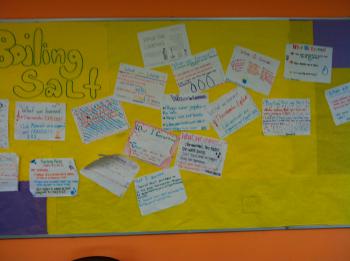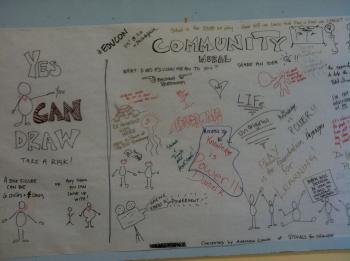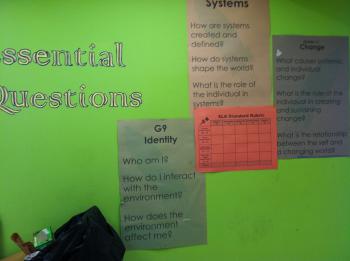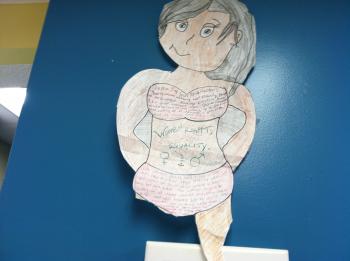Serendip is an independent site partnering with faculty at multiple colleges and universities around the world. Happy exploring!
Cross visitation field notes
Questions/ideas Laura and I discuss on the train ride over: What type of high school school is it (charter, public, private, and magnet) and what are the implications of that? Laura has described the school as very progressive; I wonder how/if social justice is included in the curriculum. What is the school community like, including, but not limited to, teacher and student relationships?
Arrive at school about 10 minutes before class begins and so decide to walk around/wander the halls. There are so many cool things on the wall, which range from posters, to students art work, to big pieces of paper with a question and students’ responses. The topics all seem to be progressive/current in some way: one paper with student responses on it was about the recent election and Romney/Obama debate; one poster advertises the multicultural club; students’ artwork includes, but isn’t limited to, themes of gender and feminism. These stood out to me because these seem like difficult subjects for high school students to approach. There was also a sign advertising multicultural club, which had prompting questions (“do you feel like you don’t have a culture?”). Laura points out there is an LGBTQ Ally sticker on most or all of the classroom doors.



As the image above shows, questions that are incorporated in students' assignments and projects. "How are systems created and defined?" and "What causes systemic and individual change?" were two that REALLY impressed me and made me excited because these are questions we as college students are dealing with. If high school students are already addressing these questions, it makes me think their futures are extremely bright and that they will have the skills and abilities to be change agents in the world.

The first class we attend is an 11th grade American History Class. The students sit at tables. Everyone works from a laptop. Walking into the room I notice a lot of student work on the walls, none graded that I saw, and from what I can tell all students are featured. One part of the wall has quotes from the Lincoln/Douglas debates and several walls feature recent posters on what they’ve been working on: comparing the Great Depression with the recent great recession. There’s a white board which labels different types of New Deal programs: Relief, Recovery, and Reform.
There aren’t bells to notify students when to change classes, but as students walk in they generally head toward their seats, though a few talk with friends. The teacher calmly tells the students to sit down, and then quickly explains that they are continuing to work on the Great Depression/Great Recession projects. This was very brief and suddenly students were on their laptops, doing work (mostly…I’ll talk about this later). I was confused and wondered if I had missed part of the assignment, but then I learned the assignment is actually more fully laid out on moodle, so the teacher didn’t really have to explain very much.
I ask some students about the laptops. Apparently they get them freshmen year and have to return them when they graduate, but many students have decorated their laptops with stickers. I was unclear whether this was specifically allowed or not, but I generally get the sense students have a lot of freedom.
I walk around the room chatting up random students. Part of me feels bad for interrupting work, so I tend to talk to students who tend to not be doing the assignment. One girl was reading a book and I asked if it was for another class. She said sort of, they have a 40 book challenge in their English class, but they can read whatever books they want, they just have to be from a range of genres. I ask her if they only do projects at school or if they have tests too and she said they don’t really have tests but they have quizzes. She mentioned something about concepts and standards and I think she said you can retake a concepts quiz if you do poorly and your grade will be replaced if you do better the second time.
I continue to move around the room and interact with a group Laura is talking to. Laura and I admit our knowledge of American History and current events is limited and ask them why the great recession happened. The students mention several reasons, including war, rade, banking systems, and agriculture.
There is a debate going on between two students at the front of the room about who is better: Nas or Jay Z. The students bring up lyrics, how they person made it big, etc. The teacher doesn’t stop this debate to tell students to do work. The students seem to have a lot of freedom. Maybe half the students are working on the assignment, but others are chatting with friends, listening to music, or surfing the internet. The teacher said at the beginning of class she was giving them class time to do this work so they wouldn’t have homework, but she doesn’t chastise anyone for not working. I have mixed feelings about this. Part of me thinks school is school and students should be working while they are there. But part of me also recognizes that these students seem really knowledgeable about the assignment overall, and maybe although the freedom seems weird to me, it may have positive benefits.
After observing the Jay Z/Nas debate, I go over to a new group of students and ask if I can ask them a couple questions about the school. They say yes and ask about the process of getting in. They say that your grades and test scores are looked at, but there is also an interview, which is the most important part of the process (which the teacher later confirms). One student said something like, “All the students who go here are bubbly, or have good personalities. There are no bullies, no fighting, no food chains”. The students all seem to be very fond of the school (which seems weird to me, I feel like most high school students would say they don’t like school!). I ask if they think this is a good school and they say yes, 97% of people go to college. They say they don’t have AP classes though. One student shows me a magazine they created, and says it’s going to be featured in the New York Times. Here is the link to view the magazine: http://issuu.com/slapenswagg/docs/winteredition . I ask them if they get a lot of creative projects and how they feel about it and one girl said she really liked it and felt like it prepared her because people learn in different ways, so it was useful that she could present information in different formats. I thought that was a really impressive response.
I tell them about my thesis (the benefits of racial integration in k-12 classrooms) and ask if they think the school is diverse and if they benefit from it. They all say it’s diverse, but only one person speaks about why: you gain multiple perspectives. Later on I asked the teacher if she knew the racial demographics of the school and she said they try to select students that reflect the population of the city.
I ask the students if they have any questions for me. One student asks if a thesis is the same thing as a dissertation and I told her to my knowledge a dissertation is what you write in graduate school and a thesis is what you write in graduate school. They ask about if it’s okay to use laptops in college. I said for the most part, I would think so, but in some small schools and classrooms I know I’ve had teachers who don’t want students to have laptops out because it distracts them. The students groan at this. It seems they’ve really adjusted to using almost only laptops and talk about how even writing a few notes out makes their hand hurt. I joke about how I feel low tech because I was writing my field notes in a notebook with a pen and a couple students say they occasionally like to write by hand for a few things. They ask what school I go to and I tell them Bryn Mawr, which is all women’s, and one of the female students says she would not like that.
I notice the classroom has an African American history textbook and learn that African American history is a course that is offered. I also notice a book on the shelf about Ebonics and Laura and I talk about how a lot of the work the students do/the books they read would be considered college level.
I also notice the two students who were debating which rapper was better earlier, now have their heads down and appear to ne napping on the table. The teacher goes over and gently pokes each of them, but doesn’t tell them to stop. I asked later if the seating was strategic and the teacher said somewhat, she tried to separate friends. I had been referring to the two students at the front because they seemed the least invested in the work/most disruptive, but she didn’t answer that directly.
When class is over, the students leave for lunch and the teacher stays in the room for a little, which gave me a chance to ask a couple questions. I asked about the demographics of the school (mentioned earlier) but also about if she explicitly talks about race in class and how she works with that (especially if students get upset, what if they feel helpless, etc). She talked about how the students engage differently with history events and recent events. Like during the Lincoln/Douglas debates, when quotes were found which labeled African Americans as lower than or beneath whites, she says the students are annoyed people really thought that, but don’t get very emotional. She said currently events that involve race are definitely more emotionally charged conversations, and she mentioned that that gets hard sometimes, but also recognized it would be impossible to have a perfect discussion.
When lunch is almost over we head to the next class, a 10th grade English class. We arrived before the class began and I asked the teacher a few questions, and about social justice vibe and particularly about the LGBTQ ally signs on the door. He said the school is fairly open and accepting and that some students were out. He also happened to be the teacher leader of the GSA and that one fun project they did was hanging signs around the school that said things like “When did you realize you were straight?” or “I’m against straight marriage”. Laura had mentioned some bathrooms weren’t labeled by gender and we asked about that too. The teacher said they sort of segregated naturally, but that also that was becoming and issue because of incidents of students having sex in the bathrooms.
Class begins and teacher explains that he was absent yesterday because of jury duty and gives a little story about jury duty in general and explains he got out of it because he knew the judge was a sibling of his friend, which made him ineligible. One student asked what you do at jury duty because the teacher had said it involves a lot of waiting. The teacher replied a lot of people read. The students ask if there was wifi and when they teacher said no they all groaned. It seems using laptops all the time has really impacted the students.
The assignment for the day was for groups to keep working on their podcasts. This teacher seemed a little stricter than the history teacher about students doing work and everyone sat quietly working, occasionally conferring with a group member for advice. Since the groups were so focused on working I felt awkward interrupting. I looked around the room and observed different things about the class. There were several posters which I would consider social justice oriented, including posters titled “images of labor” and a Peter’s World Map which represents countries accurately based on surface area. It seemed the overall school environment promoted progressive values.
Laura explained one student in the room was actually an older student who was kind of like a TA to the class. The older student, after helping a few groups, sat down and was reading and I asked him if I could ask him a few questions. He said sure. I asked how big the school was and If he knew everyone. He said it’s 125 per class and that from freshmen-junior year you are what’s called a “stream” of the same group of students, but senior year you all mix together, but generally because the school was small, people knew one another. I asked him if they had any papers, or if it was mostly projects. He explained they have papers too and actually the first half of the semester was generally dedicated to more papers ( I believe he was referring to English classes, but I’m not sure), then the switched to mostly projects the second half of the year. He talked about a paper assignment this class had earlier in the year about Ebonics and "standard" English(which seems like it could be an assignment in a college level Education class). I asked if it was only English and History classes that had projects and he said that it was all classes. He described two cool math projects he done, one involving planning how to pay off a house that cost X amount if you had Y interest rate on your bank account and another one was building a city where you had to pay special attention to angles and shapes you used, which was for a geometry class. I asked him what the student in this English class were doing and he said the podcasts had the overarching theme of “crossing boundaries”; he described the class had had a discussion about different types of boundaries such as physical motion (migration and vacations) as well as personal (relationships). I asked him how he got this position and he said it was sort of last minute and that he was surprised because he didn’t think English was his strongest subject, but he had had the teacher before and liked him so he agreed. I asked him what one of his favorite things about school was and he said the amount of flexibility and creativity, especially in math. I asked him what one of his least favorite things was and he said that he thinks some students don’t take advantage of all the opportunities the school offers.
I also noticed an Anna Deavere Smith book in the class, which again, makes me think the students are doing college level work.
After leaving the school the main theme I pondered on the train ride home was the amount of freedom it seemed the students had in class and how great this appeared to be, but on the surface it might look like students aren’t doing their assignments or aren’t paying attention because they have their laptops open. I also really appreciated the progressive vibe of the school and thought it was a great example of how real life/current/social justice issues can be part of a school curriculum.


